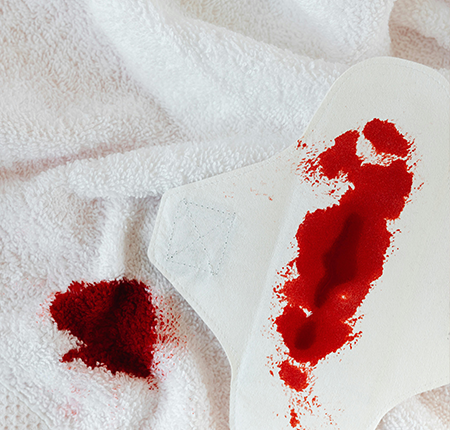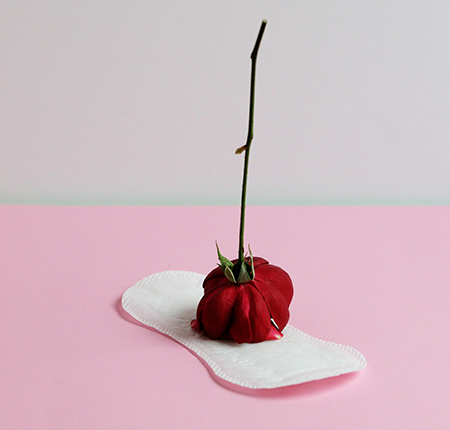
Have you heard that you can't exercise during your period? Or that it's not good to swim during that time? We've heard these and many other nonsense about menstruation. Such myths only deepen our fears and confusion about something that, in reality, is so normal and should not be a reason for shame.
So today, we're taking each of these myths one by one to see if there's any truth to them. Let's see how much of everything you've heard about menstruation is true and how much is misinformation.
What is menstruation?
Menstruation is the most obvious and visible phase of the menstrual cycle and is manifested every month by normal vaginal bleeding, through which the body removes blood and tissue from the inside of the uterus. In general, menstruation comes once every 21-35 days and lasts between 2 and 7 days.
It's important to understand that it's an absolutely normal and natural process that occurs during puberty in all women with a healthy reproductive system, and through which the body prepares for a possible pregnancy.
It's proof that your body is functioning well and that you have the ability to give life, so there's nothing impure or shameful about menstruation itself or talking about your menstrual cycle. The better you know about your period, the better you can understand yourself.
Why is it important to debunk myths about menstruation?
As important as it is to realize that menstruation and conversations about intimate health are normal, it is equally important that the information you receive is accurate and truthful.
You experience your period every month, and it's an important part of your life. That's why everything related to menstrual care, what you can and can't do during your period, is closely related to your intimate and general health.
Unfortunately, for a long time, menstruation was considered a taboo subject, and the stigma and shame surrounding this topic gave rise to countless myths that still circulate today. Some speculate negative consequences after entering water or having sex during menstruation. Others deny the possibility of pregnancy.
Without any scientific basis or medical reason, such claims can make you feel helpless, give you the impression that menstruation is a disease, and can even lead to an unwanted pregnancy.
That's why debunking these myths and clarifying the truth is important to combat misinformation, protect your health and safety, and truly understand your body, menstruation, and femininity.
Myths about menstruation - What you need to know
Today, we know that menstruation is a normal function of the female body, a blessing and a wonderful power to give life. But people didn't always know this.
For centuries, people didn't know what menstruation was or how to explain it. So they blamed it on non-human forces. They associated it with mysticism, witchcraft, punishment, or impurity. Some of the myths that arose then have survived to this day.
But it is unacceptable that women continue to suffer from misinformation, be excluded from various activities just because they are menstruating, and ignore real warning signs because they lack the necessary knowledge.
So in this section we will take each myth one by one and tell you what the truth actually is.

It is impossible to get pregnant during menstruation.
One of the most common and dangerous myths about the menstrual cycle is that you can't get pregnant on your period. The result? Many women think it's okay to have unprotected sex just because they're on their period.
This can not only lead to an unwanted pregnancy, but can also increase the risk of infections, including sexually transmitted diseases. The cervix is more vulnerable during menstruation, and the environment is favorable for the penetration of bacteria and the development of infections.
The truth: Although unlikely, it is possible to get pregnant even after unprotected sex during your period, especially if you have an irregular cycle. Sperm can survive for up to 5 days in the female reproductive tract. If ovulation occurs close to your period, there is a chance that pregnancy will occur.
Neither menstruation nor the calendar method are effective methods of natural contraception. If you do not want to get pregnant , talk to your doctor and choose a safe contraceptive method,
There is no ovulation during menstruation
As the menstrual cycle has been studied and better understood, more and more women have learned that it has 4 phases: the follicular phase, ovulation , luteal phase, and menstruation.
As a result, many people assume that these phases are very clearly delineated, and that ovulation occurs exactly in the middle of the menstrual cycle, on day 14, according to theory. But this is not always true, and the reality is far from the same for every woman.
What is the truth: Although it is an exceptional situation, it is not impossible for ovulation to occur during menstruation or immediately after.
The menstrual cycle and its phases do not follow a fixed calendar. Some women have regular cycles, other women have irregular cycles. Some women have 21-day cycles, others have 35-day cycles.
Similarly, ovulation doesn't always happen on day 14. Sometimes it happens very early. Sometimes it happens later. Factors like stress, diet, and hormonal changes can also influence the timing of ovulation.
Premenstrual syndrome is universal
Cravings, migraines, breast tenderness, and irritability are “classic” symptoms of premenstrual syndrome (PMS), very common for many women before their period. But people overlook the fact that every woman’s experience is different, that symptoms can vary from person to person and from month to month.
So, it's unfair to say that PMS symptoms are universal. Furthermore, women's emotions and grievances are often invalidated, on the grounds that "it's their fault."
What's the truth: Studies show that premenstrual syndrome affects about 47.8% of women and manifests itself differently for each person. Severe symptoms that affect daily life occur in only about 3-8% of cases. So in reality, most women control their reactions and attitude so well that people around them can't even tell they're suffering from PMS.
Intense menstrual pain is normal
Even if you didn't grow up with this belief, you've probably heard it at least once. Women have long been told, unfortunately even by doctors, that pain is a basic feature of menstruation and that it's normal. But it's just a myth.
What's the truth: It's normal to experience some discomfort during your period as your uterine muscles contract to expel the endometrium and menstrual blood. But it's not normal for this pain to be so severe that you can't get out of bed, feel nauseous, faint, or otherwise be unable to carry out your normal daily activities.
Severe menstrual pain can indicate a more serious health condition, such as endometriosis, and it's important to discuss your symptoms with your gynecologist. They can help you find solutions to manage your pain so you can continue your normal life even during your period.

Physical exertion is prohibited during menstruation.
Be honest, did you skip gym class in high school when you were on your period? We did too, and so did entire generations of girls who were told that sports were contraindicated during menstruation. Except that's not the case.
The truth: Moderate exercise and any form of light exercise are safe and have no negative impact on your period. In fact, studies show that exercise stimulates blood circulation and the production of endorphins, which can help relieve cramps.
Missing a period always means pregnancy.
The absence of menstruation, or amenorrhea , is indeed one of the first signs of pregnancy. For this reason, many women assume that a late or absent period automatically means they are pregnant. But the truth is more complex.
What's the truth: There are many other causes that can lead to delayed or absent periods. Dietary changes, chronic stress, weight fluctuations, intense physical exertion, certain medications and health conditions, and hormonal imbalances can all cause delayed or temporary loss of menstruation.
A pregnancy test is the most effective way to confirm a pregnancy. If the result is negative, go to your gynecologist for further investigations to determine the real cause.
Sexual contact is prohibited during menstruation.
Sex during menstruation can be a little… messy. For some couples, it can even seem uncomfortable. It's understandable how the myth that sex is forbidden during menstruation arose. It's just not true.
Here's the truth: Menstruation is not a disease and shouldn't put your life on hold. In fact, most of the things you normally do, you can do during your period. And sexual intercourse during this period is not forbidden, but optional. It's your choice.
If you're not comfortable, it's perfectly fine to skip sex, whether on your period or any other day. But if you want to, there's no medical reason to avoid sex during your period. In fact, some women find that their libido increases during this time, that pleasure is enhanced by natural lubrication, and that menstrual cramps are relieved after sex.
Hot baths are not recommended during menstruation.
Hot water stimulates vasodilation. During a bath, the hotter the water, the more the blood vessels dilate and stimulate blood circulation, which can lead to more intense bleeding. This is how a new set of myths was born: that hot baths can hurt your period, that hot water can cause you to bleed continuously, and that baths in bathtubs are not recommended.
The truth: Hot showers and baths don't hurt your period or cause bleeding that won't stop. On the contrary, medical professionals recommend hot baths because they help relax muscles, relieve cramps, and reduce discomfort.
Just make sure you adjust the water to a comfortable temperature, not too hot, to avoid heavy bleeding.
Using tampons can cause the hymen to tear.
Because of the traditional association of the hymen with virginity, teenage girls have long been told that they should avoid using tampons to prevent tearing the hymen and losing their virginity. However, the topic is vast and we need more education on this topic.
The truth is: Virginity is just a social construct related to the beginning of sexual life, and tampons have nothing to do with these concepts. Tampons are menstrual care products, designed solely for protection and management of vaginal bleeding, with no sexual implications.
As for the hymen, it is a very elastic tissue. It is possible for it to be so strong that it does not tear with the simple use of a tampon. And it is equally possible for it to be so sensitive that it simply tears during cycling or intense physical exertion.
Using tampons is a safe method of menstrual care, just like using pads. It's a matter of personal preference, and your only priorities should be comfort and safety. Choose 100% organic tampons , made with only 100% organic cotton and free of other toxic chemicals that can cause allergies, irritation, or discomfort.
Blood loss during menstruation can lead to fainting
Sometimes menstrual bleeding seems much heavier than it actually is. This impression can fuel the fear of losing so much blood that you faint or become anemic.
The truth: Although it may seem like you're losing more blood because it's mixed with endometrial tissue, cervical mucus, and vaginal secretions, the average woman only loses 30-80 ml of pure blood during a period. That's the equivalent of 2 to 6 tablespoons of fluid. For healthy people, it's not enough to cause fainting.
If you're passing out during your period, it's most likely due to something other than the amount of blood you're losing. But if you're having an unusually heavy flow or needing to change your pad every hour, talk to your doctor, as it could be a red flag.
You are not allowed to swim during menstruation.
It's the same situation as with hot baths and sex during menstruation. Citing reasons such as hygiene or possible bleeding that won't stop, the myth circulates that swimming is prohibited during that time of the month. But the truth is the opposite.
What's the truth: Swimming during menstruation is a recommended form of exercise, which stimulates blood circulation, helps relax muscles and helps reduce menstrual pain. Use an internal tampon to prevent leakage and enjoy swimming in peace.
Furthermore, the water pressure can temporarily slow down menstrual flow, so menstrual blood leakage is very unlikely. As for hygiene, that is precisely the purpose of chlorine and special substances in the pool: to prevent the transmission of bacteria and infections.

Menstruation means the elimination of "dirty" blood
Because people have long associated menstruation with a curse or divine punishment, there is still the myth that this is how women “cleanse” themselves of “dirty,” “bad,” or “impure” blood. This concept is completely wrong and only amplifies shame and stigma.
What's the truth: Menstruation is not a purification, it's not a curse or a complex. It's a natural process by which the body sheds the endometrial tissue that has been preparing month after month to support a pregnancy. There is nothing dirty or impure about menstrual blood, but simply a mixture of blood, uterine tissue, cervical mucus, and vaginal secretions.
If we were to look at things from a mystical perspective, menstruation is a superpower for women. The power to renew themselves every month and create within themselves a new life to bring into the world.
Frequently asked questions about menstruation myths
Menstruation is a complex process, which is not universally manifested and which every woman experiences differently. So it is normal to have a lot of questions. The important thing is to clarify them without shame, with correct and scientifically supported information. Below we have prepared some of the most frequently asked questions about menstruation myths and the correct answers:
Does menstruation have to come every 28 days?
The 28-day cycle is just an average of the normal length of a menstrual cycle. In reality, the length of a healthy menstrual cycle can vary between 21 and 35 days. In fact, the length of the cycle can even vary from one month to the next, depending on diet, stress levels, weight fluctuations, or physical activity.
However, talk to your doctor if your cycle length is shorter than 21 days, longer than 35 days, or if unusual changes occur.
Should sports be avoided during menstruation?
No. Light to moderate physical activity is actually recommended during your period, as it can help relieve cramps, bloating, and mood swings. Exercise stimulates blood circulation and the release of endorphins, or "happy hormones," so feel free to swim, jog, do yoga, or do other gentle forms of exercise.
Do women become more emotionally unstable during their menstrual cycle?
The idea that women are emotionally unstable during menstruation is an unfair generalization and exaggeration. It's true that some women may experience mood swings, irritability, or increased sensitivity around their period due to hormonal fluctuations. But that doesn't mean that all women become unstable or irrational.
The menstrual experience is different for every woman. Associating any emotional reaction with “it must be coming” is often used to unfairly discredit women.
Is it embarrassing to talk about menstruation?
No, absolutely not. There is nothing shameful about discussing the human body and a process as natural as menstruation. Nearly half of the global population is girls and women, and open conversations about menstruation are essential to combat misinformation and educate ourselves about menstrual care and intimate health.
If you use tampons, can you lose your virginity?
No. Virginity is not an actual physical concept, but a social and cultural one, related to the beginning of sexual life and the breaking of the hymen. Using a tampon is strictly related to menstrual care, has no sexual implications, and certainly does not mean you have "lost your virginity."
In some cases, inserting a tampon can contribute to stretching or partially tearing the hymen, but this can also happen during activities such as sports or cycling. Using tampons is a choice strictly related to personal comfort and hygiene, and not an act that defines your morality or sexuality.
Photo source: Pexels.com






















